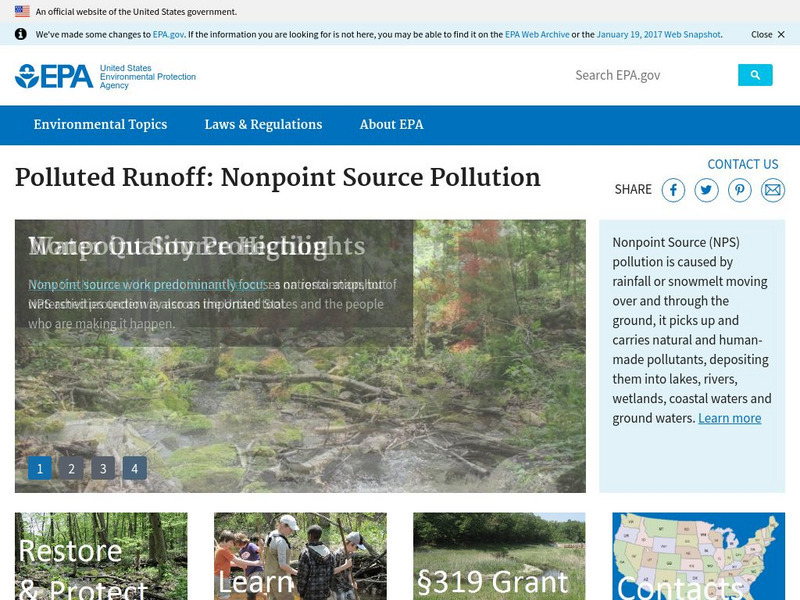Hi, what do you want to do?
Michigan Sea Grant
What's in This Water?
Pupils investigate the biological and chemical characteristics of water to determine where purple loosestrife occurs. They create data sheets to record water quality tests in several locations and work in groups to conduct the water...
Curated OER
Lentic Ecosystem or Lotic Ecosystem
Students explore the differences between lentic and lotic ecosystems. In this ecology lesson students study the water systems in Pennsylvania.
Curated OER
Land Development and the Environment
Students examine the relationship between land development and the environment. In this environmental stewardship lesson, students explore how population density, land development, transportation, and impervious surfaces take their toll...
Curated OER
Teaching about Conductivity
High schoolers explore conductivity and productivity in aquatic systems.
Curated OER
Got Water?
Students determine that delivering clean, fresh water to citizens around the world involves and affects politics, economics, international relations, and technology. They brainstorm a list of factors that might affect their town's...
Curated OER
Riparian Buffers
In this riparian buffer worksheet, students click on the links to learn about why we should maintain the riparian buffer and answer short answer questions about it. Students answer 7 questions.
Curated OER
Wetland in a Pan
Students examine wetlands and what the effects of destroying them will do. In this wetland lesson students relate the importance of wetland functions to their own needs.
Curated OER
Mud in the Water
Sixth graders investigate erosion. In this erosion instructional activity, 6th graders explore how farming changes the environment. Students construct an erosion model and research ways to protect the soil from excess mud generated by...
Curated OER
Not Just a Fish Tank
Pupils learn about a specific species of fish, study the effects of outside substances on the reproductive development of a fish, and explore the process of a wastewater treatment facility.
Curated OER
Journey of a Raindrop to the Chesapeake Bay
Students explore the water cycle and the path a single drop of water would take if it traveled from their schoolyard to the Chesapeake Bay in Virginia.
Curated OER
What is Happening to Our Water?
Students compare and contrast Wisconsin's water resources to that of Puerto Rico. They research books about islands, particularly the Puerto Rican islands. Student view illustrations of island ecology. They discuss the illustrations and...
Michigan Sea Grant
Water Quality
Learners observe water samples and measure the samples' water quality. Learners develop their own criteria for measuring water quality and test for temperature, acidity, oxygen levels, turbidity, conductance, sediment and hardness.
Curated OER
The Water Cycle
Young scholars are introduced to the components and importance of the water cycle. They are shown how groundwater moves using a model. Students list 9 places on earth where water is found. They define the terms cycle and water cycle.
Curated OER
Are You Getting Thirsty?
High schoolers study droughts and how they affect communities and coastal ecosystems. In this ecosystems lesson plan students use data to examine drought conditions in certain areas.
Curated OER
Wetlands Project
Students discover how wetlands filter out contaminants before they can reach other bodies of water. In groups, they design and build a model of a stormwater wetland. They test the water quality and inform their classmates about the...
Curated OER
Rainy Day Hike
Pupils develop awareness about the water cycles. They identify the watershed in which their school is located. They explain the role the schoolyard plays in the watershed.
Curated OER
Mud in the Water
Students build a soil erosion model to study the importance of soil conservation. They investigate how land forms from both constructive and destructive forces.
Curated OER
The Water Cycle
Students create an "animated" water cycle wheel that illustrates where water comes from and where it goes.
Curated OER
Don't Cry Over Spilled Oil
Students study the Exxon Valdez Oil Spill while evaluating oil spill clean up activities. They discover the long term impact can have on an ecosystem by completing this experiment.
Curated OER
Science: Making Career Connections
Students explore careers in oceanography. They compare and contrast requirements for careers in the field, and determine what high school courses would help to prepare them. Finally, they create a computer-based project related to...
Curated OER
Land Use and Nitrogen
Students consider the effects of development on water quality. They test nitrogen levels in waters before and after development, investigate wastewater treatment options and research best management practices to reduce nitrogen loads.
Curated OER
Water Quality Monitoring
Students comprehend the four parameters of water quality. They perform tests for salinity, dissolved oxygen, pH and clarity or turbidity. Students comprehend why scientists and environmental managers monitor water uality and aquatic...
US Environmental Protection Agency
Epa: Polluted Runoff: Nonpoint Source (Nps) Pollution
EPA site offers answers to what nonpoint source pollution is as well as provides links and information as to what concerned citizens can do about it.
Other
Nc Department of Energy and Natural Resources: What Is Stormwater Pollution
When it rains, some of the rainwater soaks into the ground, and part of it flows over the ground and directly into creeks, streams, or rivers. This water that runs off into the river is called runoff, or sometimes stormwater runoff....




























